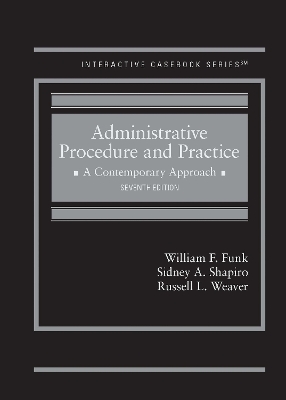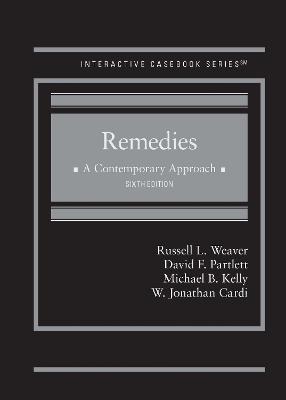Interactive Casebook
2 total works
Administrative Procedure and Practice
by William F. Funk, Sidney A. Shapiro, and Russell L Weaver
Published 12 July 2023
The 7th Edition of this popular casebook continues its focus on real problems and real administrative practice. Problems serve as the primary pedagogical tool, including problems that do not involve courts. The book raises ethical issues distinctive to government lawyers, requires students to parse statutory and regulatory text in solving problems, and orients the course around administrative law practice rather than theory. While theory is not ignored, the book focuses on reality-based problems that put theory in context. It includes the most recent important Supreme Court and Courts of Appeals cases, including West Virginia v. EPA, Kisor v. Wilkie, Seila Law v. CFPB, United States v. Arthrex, and Jarkesy v. SEC.
The 7th Edition continues to be an Interactive Casebook, featuring a novel visual display and layout using text boxes, color/border segregated feature sections for hypotheticals, reference to scholarly debates, useful information for students, and provocative questions. A major distinguishing feature of the book is its inclusion of an accompanying electronic version with the extensive hyperlinking to Westlaw versions of legal materials, Black's Law Dictionary definitions, supplementary online resources and more.
The 7th Edition continues to be an Interactive Casebook, featuring a novel visual display and layout using text boxes, color/border segregated feature sections for hypotheticals, reference to scholarly debates, useful information for students, and provocative questions. A major distinguishing feature of the book is its inclusion of an accompanying electronic version with the extensive hyperlinking to Westlaw versions of legal materials, Black's Law Dictionary definitions, supplementary online resources and more.
Remedies
by Russell L Weaver, David F. Partlett, Michael B Kelly, and W. Jonathan Cardi
Published 31 January 2024
This new edition continues to execute our primary goal-to create a "teacher's book"-a book that contains thought provoking problems (referred to as "hypos" or "Food for Thought" in the Interactive Casebook Series) designed to stimulate thought and produce interesting classroom discussion. The hypos and Food for Thought are woven throughout the chapters and are designed to help students learn doctrine, illuminate trends in the law, and ultimately produce better learning. A secondary goal was to include a focus on teaching "skills." Many of the hypos place students in practical situations that they are likely to encounter in practice, and therefore encourage students to think about how they might handle those situations in real-life.However, the book has been updated and refreshed with a number of new cases: K-Mare Corp. v. Oriental Plaza, Inc. (adequacy of legal remedies); Navajo Academy, Inc. v. Navajo United Methodist Mission School, Inc. (discretionary nature of equitable relief); Verenes v. Alvanos (the right to jury trial); Al Hirschfield Foundation v. Margo Freiden Galleries, Ltd. (civil contempt sanctions); Federal Trade Commission v. Trudeau (contempt sanctions); Susan B. Anthony List v. Driehaus (declaratory relief); Ride the Ducks of Philadelphia, LLC v. Duck Boat Tours, Inc. (requirements for preliminary relief); Habitat Education Center v. United States Forest Service (bond requirement); and National Collegiate Athletic Association v. Governor of New Jersey (contempt damages). In addition, it contains a new section explaining the pros and cons of nationwide injunctions, as well as a number of new Hypos and Food for Thought boxes.

